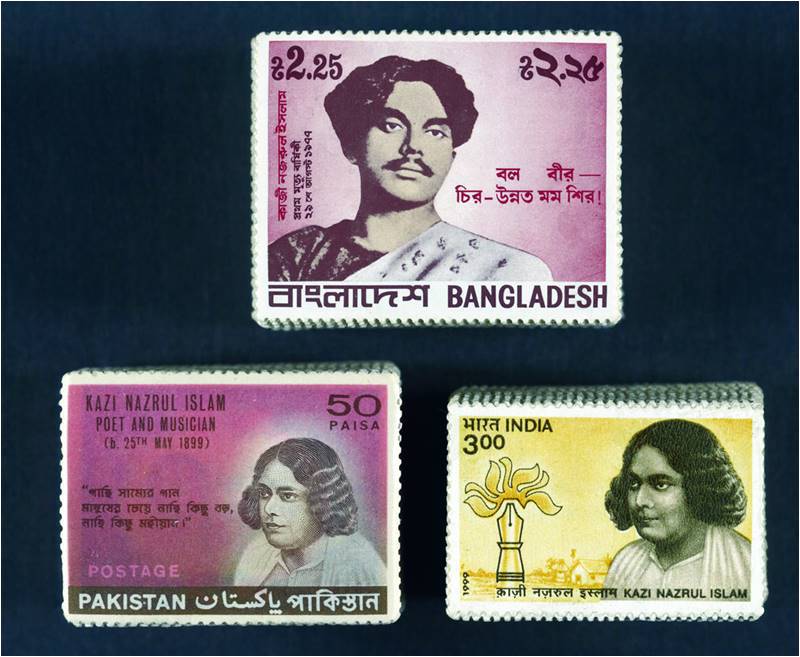
This contemporary installation by artist Naeem Mohaiemen housed at the British Museum carries postage stamps from Bangladesh, Pakistan and India which depict Kazi Nazrul Islam (1899–1976). Nazrul’s work has been commemorated and claimed by all three nations at various times. His poetry transcends territorial boundaries in its celebration of humanity against oppressive authority and its promotion of Hindu-Muslim fraternity.
Nazrul was a poet, writer, musician, anti-colonial revolutionary and the national poet of Bangladesh. He produced a large body of poetry and music with themes that included religious devotion and rebellion against oppression. His activism for political and social justice earned him the title of ‘Rebel Poet.’ His compositions form the avant-garde genre of Nazrul Sangeet (Music of Nazrul).
Born in a Bengali Muslim family, Nazrul received religious education and as a young man worked as a muezzin at a local mosque. He learned about poetry, drama and literature while working with the rural theatrical group Letor Dal. He joined the British Indian Army in 1917. After serving in the Middle East (Mesopotamian campaign) during World War I, Nazrul established himself as a journalist in Calcutta. He criticised the British Raj and called for revolution through his poetic works. His nationalist activism in Indian independence movement led to his frequent imprisonment by the colonial authorities.
His writings greatly inspired what eventually became the independence movement in Bangladesh.
Nazrul’s writings explored themes such as freedom, humanity, love, and revolution. He wrote short stories, novels, and essays but is best known for his songs and poems. Nazrul wrote and composed music for nearly 4,000 songs (many recorded on HMV and gramophone records), collectively known as Nazrul Geeti. In 1942, at the age of 43, he began to suffer from an unknown disease, losing his voice and memory. A medical team in Vienna diagnosed the disease as Pick’s disease, a rare incurable neurodegenerative disease. It caused Nazrul’s health to decline steadily and forced him to live in isolation in India. He was also admitted in Ranchi (Jharkhand) psychiatric hospital for many years. At the invitation of the Government of Bangladesh, Nazrul and his family moved to Dhaka in 1972. He died four years later in 1976 in Bangladesh.
Nazrul was a poet, writer, musician, anti-colonial revolutionary and the national poet of Bangladesh. He produced a large body of poetry and music with themes that included religious devotion and rebellion against oppression. His activism for political and social justice earned him the title of ‘Rebel Poet.’ His compositions form the avant-garde genre of Nazrul Sangeet (Music of Nazrul).
Born in a Bengali Muslim family, Nazrul received religious education and as a young man worked as a muezzin at a local mosque. He learned about poetry, drama and literature while working with the rural theatrical group Letor Dal. He joined the British Indian Army in 1917. After serving in the Middle East (Mesopotamian campaign) during World War I, Nazrul established himself as a journalist in Calcutta. He criticised the British Raj and called for revolution through his poetic works. His nationalist activism in Indian independence movement led to his frequent imprisonment by the colonial authorities.
His writings greatly inspired what eventually became the independence movement in Bangladesh.
Nazrul’s writings explored themes such as freedom, humanity, love, and revolution. He wrote short stories, novels, and essays but is best known for his songs and poems. Nazrul wrote and composed music for nearly 4,000 songs (many recorded on HMV and gramophone records), collectively known as Nazrul Geeti. In 1942, at the age of 43, he began to suffer from an unknown disease, losing his voice and memory. A medical team in Vienna diagnosed the disease as Pick’s disease, a rare incurable neurodegenerative disease. It caused Nazrul’s health to decline steadily and forced him to live in isolation in India. He was also admitted in Ranchi (Jharkhand) psychiatric hospital for many years. At the invitation of the Government of Bangladesh, Nazrul and his family moved to Dhaka in 1972. He died four years later in 1976 in Bangladesh.

